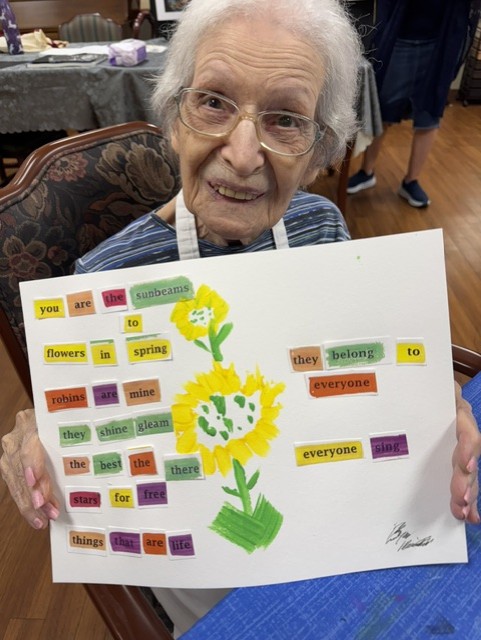This is the last of the three-part series about retirement.
In the 2021 report from Edward Jones and Age Wave, members of the Boomer and Silent Generations were asked what “successful” retirement looked like. Most painted a picture of having a positive impact on family and/or others and being happy with who they are. Here are the top three things that contributed to their identity post-career:
61% Relationships with loved ones
32% Faith
26% Values
22% Financial well-being
14% Being involved in causes that matter
10% Past work/accomplishments
Take out the financial well-being and past work accomplishments and you could easily argue that the remaining attributes connect with the questions and concerns of living a spiritual life.
When asked another way, 92% of the respondents indicated that having purpose was key to retirement success. And what were the greatest sources of purpose in the order of responses?
67% Time with loved ones
55% Doing interesting/enjoyable things
53% Being true to oneself
40% Being generous or giving back
38% Living a faith-filled life
32% Living a fun-filled life
21% Fulfilling life’s goals
16% Financial wealth
Again, the top 7 on this list connect with the kinds of qualities that faithful people strive to know in their lives. And remember, most of the people who completed these questions, most likely, are not connected with organized religion. (These researchers didn’t ask this question, but based on other data, it is suggested that 30% or less of retirees belong or participate in religious organizations) And yet, they are asking questions similar to the ones we consider as faithful disciples learning to identify the sacred around us.
Retirees and Mission
So, what does all of this have to do with the ministry of local congregations? I think there are many important observations here.
When retirees were asked what is important to them in retirement, there were four categories that clearly were of equal importance: Family, Health, Purpose, Finances. The first three of these easily connect with congregational ministry. The fourth one, “how to save enough to last through retirement”, is one to leave to the financial experts. But I can tell you, by virtue of the fact that a leading financial wealth management company was involved in this report, those finance experts are also learning how to address the other three issues with their clients because it appears that no one else, including faith communities are:
What do we need to do to live a healthy life?
What activity gives us a sense of purpose, meaning and fulfillment?
And how do we want to maintain or improve family relationships? The researchers noted that this last one around family, has increased in importance since the start of the pandemic in 2020.
Talents and Gifts
Over 85% of retirees affirmed the need for there to be more ways for them to use their talents and knowledge to the benefit of their communities. Churches are most fully vibrant when their members’ talents and knowledge intersect with the mission of the church.
What if your congregation began not with the task of convincing people to fill your volunteer needs that have been the same for generations? Instead, what if we began with asking what skills and knowledge retired individuals would like to offer the world? What if one of the church’s ministries was to help connect those individuals with a variety of organizations in the community?
Just by asking the question we signal that we value the gifts of everyone, regardless of their age. But we need to ask the question. What if, when a member of the church retires from their day job, we were to ask them if they wanted to try a different opportunity, volunteer role, leadership role at church? We need to ask so as to empower them to identify where the spirit is calling them to use their energy at the various stages of life. One colleague challenged congregants to give a “gap” year to the church following their retirement. They were invited to increase their participation in the congregation for a year around a project or ministry which energized them. I only know of one individual who took them up on the opportunity, but it offers a different way of thinking about this life transition.
Meaning and Purpose
The question of what gives us purpose is another natural fit for congregations. We know that over half of new retirees are looking to start a new chapter. And in order for that chapter to succeed, they would like to have a sense that their lives in this new chapter make a difference.
The role of purpose and meaning is increasingly important in the research in the lives of older adults. So how can the church exercise our theological muscles to help frame this for the people in our congregations? This is a challenge because those who are retired today are already older than most of the faithful whose lives are recorded in the biblical text. The biblical examples of older adulthood are few.
How can we engage with our faith tradition to give these years meaning and purpose? This is one of the key factors when researchers have examined areas around the world where larger than average numbers of people live well beyond 90 years. In Japan this is called, Ikigai. Literally is has to do with having a reason to get out of bed in the morning. This is a deeply theological area, too big to significantly explore here. But our Ikigai changes over our lifetime. What gives meaning and purpose today may not be attainable in another decade. But how can we provide the opportunity to reflect about what it is in the time that of life that connects me with others, with community and with the sacred?
What is our purpose as God’s beloved as we move into this life chapter? Previously our job title may have given us purpose. Or perhaps our roles as parents or adult children significantly gave us purpose. When we no longer have to car-pool kids to activities or pay for college, our role as parent changes. When we no longer define ourselves or measure our worth by the jobs or careers that have framed the first two chapters of adulthood, how do we wrestle anew with these basic questions? The quality of later life hinges on this exploration.
Family Affairs
And what about family relationships? Churches in the 21st century are some of the only inter- or multi-generational organizations in our culture. Everything else is very age segregated. From preschool through post-graduate institutions, there is an expectation of individuals of a specific age to be engaged in each stage of the learning process.
Working with college interns, I note that one of the big adjustments is learning how to participate in an environment next to people that span 50 years of age differences. Many have not ever done this outside an occasional relationship with a teacher or neighbor. The different generations of their own family are too scattered to have built up the social muscle and opportunity to appreciate these relationships cross-generations.
Technologies have evolved to be more attractive to specific generations. Clothing brands have their ideal aged customer. Slowly, advertisers are catching on that it would be beneficial to their brand if they thought about how to welcome older consumers into their marketing plans—if for no other reason that about 70% of disposable income in this country comes from those over the age of 50.
I believe that churches today are one place that could overcome this age segregation within the realities of the communities in which they are located. This is not easy because congregations have to traverse all these generational differences from communication, to music preferences, acceptable clothing and the like. But these are not new questions and the desire to connect and learn from each other could overcome some of these challenges.
Congregations are places where relationships can be formed that can also help to fill the void for family relationships that are not present in everyone’s life. From filling in for grandparents who live thousands of miles away to supporting other members when they return home from medical procedures, congregations can become a part of the connective fabric that might otherwise be expected of family. In the LGBTQ community, they have been naming their “families of choice” for a long time. As we age, perhaps we all could benefit from choosing those who can fill roles which blood-relatives filled in generations past.
Exploring Possibilities
If you or your church is having a difficult time seeing the individuals in your midst who are experiencing this third-third of adulthood as a time of possibility, hope, resiliency and potential, then perhaps just starting with an exploration of aging would be helpful. We live in an ageist culture and we have all internalized these messages. You want examples? Just look at the birthday card aisle in any store.
If we don’t take an honest look at how we view aging, then we will continue to let financial advisors be the ones who are paying attention to what retirees want and need to live full lives. And when this happens, the church, our congregations will be failing to see the needs of our neighbors because we have chosen to overlook them based on their age.
Just one more plug: The Ruth Frost Parker Center published a resource in 2020, Another Day Older. It is a guide for small group conversations to gather for 4 sessions to look at how ageism affects us all. Each session is supported with a video to help with the conversations. Additionally, each session includes a section to look at aging through a lens of faith. This is available for your free download here. Congregations may copy the materials for participants whether they meet virtually or in person.
Friends, this is a call for the church to embrace that we all have been created in the image of God. This is an invitation to explore ministry with those who our society prefers to overlook. God does not give a “best used by” date on our lives. Instead, God invites us again and again to see our place in the church, the body of Christ.
May the research of the generation of folk who are retiring around us, help to ignite new awareness of the immense opportunities for our congregations to welcome and accompany them as them move into their third third of adulthood. They are searching and asking the questions. Are we willing to accompany them as they venture into the new frontier of life after our primary careers?
11/18/21 17:30
View all articles by:






















